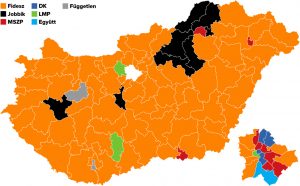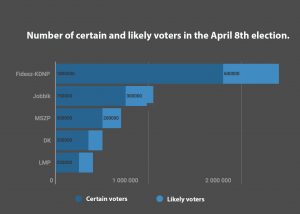It’s decided. I had wanted to write this blog post yesterday so that there would be some uncertainty in the outcome in the Hungarian national election, but unfortunately, it’s all too clear: Victor Orbán is still in power. And Hungary may have taken another step away from democracy.
Let me backtrack. Yesterday, April 8, was the Hungarian national parliamentary election. Starting in the early morning, Hungarian citizens in Hungary’s 106 electoral districts cast their votes for one of about ten parties. It was an exciting day, with people lining up for blocks at polling stations and news updates throughout the evening. The U.S. embassy even sent out warnings to avoid Kossuth Square in front of the Parliament Building last night because tensions between the supporters of various parties might be “high.”
The undisputed winner of the election was the Fidesz (fee-DES) party, a nationalist, right-wing organization whose leader, Victor Orbán, has been prime minister for ten years. I find Fidsez frightening for several reasons. First, the party is anti-migration, going to the extreme of building a razor-wire fence along its southern border in 2015 to keep refugees out of the country. Preventing immigrants from entering Hungary is a hallmark of the Fidesz political platform. In addition to enacting xenophobic policies, Orbán’s party has systematically taken control of news media and redrawn electoral districts to keep itself in power. In recent years, the group has moved even more aggressively to alter the Constitution of Hungary in order to control courts, allow for rampant corruption, and according to some critics, effectively dismantle Hungarian democracy.
I am worried for Hungary because I believe that Fidesz poses a real threat. As Princeton University professor Jan-Werner Müller predicted in a recent New York Times Od-Ed piece: “This election is probably the last before Hungary shifts from what is already a deeply damaged democracy to what political scientists would call a full-blown electoral autocracy.”

One of the posters funded by the government that have filled the streets in the weeks leading to the election.

Another poster, with Soros and the leaders of opposition parties cutting the fence to let in migrants.
I can only imagine it’s a scary time for liberals in Hungary. The only Hungarians I interact with regularly—my professors—are relatively reserved about politics, but it’s clear that most of them fall on the left of the political spectrum. From what they’ve said to us, I can sense that progressive Hungarians are frustrated, angry, and tired. We Americans have had Trump for over a year. They’ve had to fight against Orbán for nearly ten years. And the clock just restarted.
 The maps of the electoral districts show how much of a landslide victory this was. And in case you’re wondering, the largest opposition party, Jobbik (in black), is even more extreme right than Fidesz.
The maps of the electoral districts show how much of a landslide victory this was. And in case you’re wondering, the largest opposition party, Jobbik (in black), is even more extreme right than Fidesz.

One of the critical pieces of information about this election is that turnout was very high. I haven’t found a percentage yet, but as of 3pm yesterday, 54% of Hungary’s voters had already cast a ballot. Government officials have celebrated the turnout as a triumph of democracy. Before yesterday, opposition leaders anticipated that high turnout would disadvantage Fidesz. In fact, the opposite proved true. Fidesz is projected to have another supermajority of 133 of the 199 seats in Parliament. In effect, Fidesz will be able to unilaterally change the Constitution (they received the same number of seats in 2014). This is the mandate that the people have given them, supposedly.
If Orbán is so bad for democracy, I’ve wondered to myself, what happened? How could he and his party have won this election? Gerrymandering certainly played a part in the landslide victory, as well as divided opposition parties. Most of the districts in Budapest could have been won by opposition parties, according to one commentator, if they had not split the vote between them.
However, it can’t be avoided that most Hungarian votes want Fidesz in power. Polling shows that the party and their platform is popular. The majority of Hungarians want to build walls rather than bridges, and they appear to be willing to sacrifice freedoms to achieve the economic and physical security that Fidesz promises.
It’s hard for me to understand, but I’m trying.
More to come on this soon.




